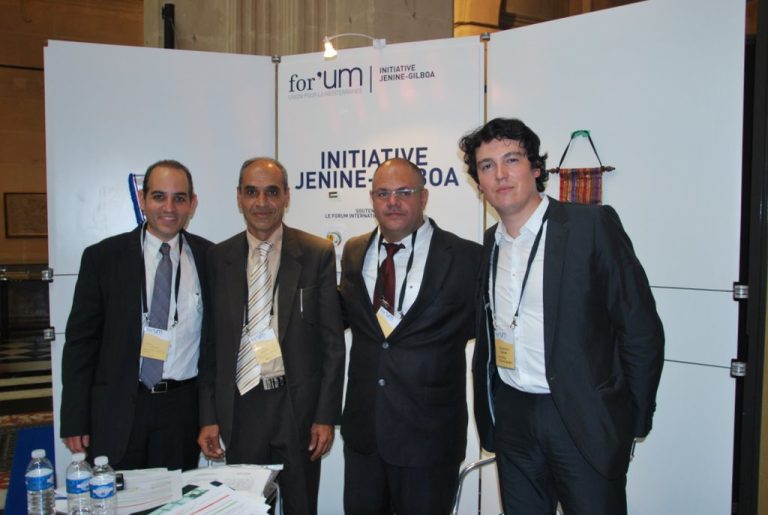Plusieurs événements risquent très prochainement de créer la surprise au Proche-Orient, alors pourquoi ne pas relancer sérieusement les espoirs de paix entre Palestiniens et Israéliens?
Le premier changement notable qui pourrait intervenir est un échange de prisonniers : la libération d’un millier ou plus de palestiniens détenus en Israël, dont le célèbre et symbolique chef du Fatah Marwan Barghouti, en échange du soldat israélien Gilad Shalit. Les intermédiaires français, allemands, turques et surtout égyptiens y consacrent des efforts importants. En témoigne la présence de plusieurs responsables israéliens et du Hamas au Caire ces derniers jours, à commencer par le Général Amos Gilad, conseiller du Ministre de la défense, et le chef de la branche armée du Hamas. Un entretien a également eu lieu entre Ehud Barak, Ministre israélien de la défense, et le Maréchal Tantawy.
La question des prisonniers, au combien importante pour les Israéliens et les Palestiniens, donnerait un nouveau souffle, une chance réelle de reprise des négociations.
Cela signifierait que pour la première fois, Hamas, Fatah, et un gouvernement israélien dirigé par le Likoud réussiraient à surmonter leurs divergences pour arriver à un accord concernant les prisonniers palestiniens et la libération de Gilad shalit. Il s’agirait d’un geste fort: non seulement un signe de bonne volonté, mais aussi et surtout un geste politique permettant au gouvernement israélien et à la communauté internationale de reconnaître un gouvernement Hamas-Fatah unifié.
En effet, la constitution récente de l’unité nationale chez les Palestiniens permet une relance du processus démocratique. Les élections prévues pour la fin de l’année, la reprise probable des négociations, s’inscrivent dans la droite lignée du vent de liberté que fait souffler le printemps arabe dans la région.
Aussi, la Conférence des donateurs initiée par la France, prévue pour le mois de juillet, a pour objectifs de développer les réalisations économiques et de renforcer les institutions palestiniennes en germe. Par là, la France affirme une ferme volonté de donner à la prochaine création de l’Etat palestinien une dimension hautement politique.
Il est important de se fonder sur les paramètres énoncés le 19 mai par le Président Barack Obama. Ouvrir des pourparlers concernant les territoires sur la base des frontières de I967, consacrer les garanties de sécurité aux deux Etats, envisager d’ici un an les négociations sur les réfugiés et Jérusalem, constitueraient les jalons essentiels d’une future réconciliation.
Au regard de tous ces éléments, il est donc possible qu’Israéliens et Palestiniens parviennent à conclure un accord qui verrait la création d’un Etat palestinien cette année. Au lieu de la reconnaissance symbolique par l’Assemblée générale des Nations-Unies, une déclaration internationale instaurant l’Etat de Palestine aux cotés de l’Etat d’Israël est nécessaire et plus que souhaitable.
Les paramètres de la réconciliation et d’une paix durable pourraient être les suivants:
– Jérusalem-Est sera la capitale de la Palestine et Jérusalem-Ouest celle d’Israël. Les 1,5 km2 de lieux saints seront administrés par un Comité regroupant Israël, la Palestine, la Jordanie, le Maroc, l’Arabie Saoudite et le Quartet par exemple.
– Sur la question des réfugiés, Israël et les pays arabes reconnaîtront leurs responsabilités dans la tragédie qu’ils ont subis. Un fond d’indemnisation doté de soixante milliards de dollars alimenté par Israël, les pays producteurs de pétrole et les pays de l’OCDE permettra de dédommager et/ou aider tous ceux qui désireront s’installer en Palestine. Les réfugiés préférant rester dans les pays d’accueil (Liban, Syrie, Irak ou ailleurs) pourront devenir citoyens à part entière de ces Etats, lesquels leur accorderont la nationalité ainsi demandée.
Israël devra également accepter certains réfugiés au nom du regroupement familial, comme discuté entre le Président Mahmoud Abbas et le Premier Ministre Ehud Olmert.
Les habitants des colonies juives qui le désirent seront intégrés dans l’Etat de Palestine et deviendront citoyens palestiniens à part entière.
– Sur la question de la sécurité, les Etats du Proche-0rient signataires de la paix pourraient créer une force régionale en partenariat avec l’OTAN. Des soldats d’une force multinationale (comme ceux basés dans le Sinaï) seraient déployés aux frontières jordano-palestinienne et égypto-palestinienne.
Une normalisation des relations entre les Etats de cette région entraînera l’établissement de liens diplomatiques entre la Palestine, Israël et leurs voisins arabes et musulmans. Les pays ouvriront une nouvelle ère de coopération, d’échanges et de développement dans tous les domaines (culturel, économique, scientifique…).
– Entre Israël et la Syrie, la question du plateau du Golan pourra se régler par une démilitarisation de ce dernier qui serait restitué à Damas, et l’offre d’un bail pour les terres louées à des Israéliens.
Finalement, l’objectif majeur est qu’à moyen terme, Israéliens, Palestiniens et toutes les autres populations arabes voisines se dessinent un futur commun.
Des commissions de réflexion devraient être mises en place pour examiner les possibilités et les moyens de bâtir à terme une Confédération israélo-jordano-palestinienne d’abord, élargie à d’autres pays arabes ensuite. Ou en échange explorer une possible adhésion d Israël et de La Palestine a union Européenne.
Pour ce faire, les sociétés civiles doivent aujourd’hui plus que jamais faire pression sur leurs dirigeants pour les pousser à mettre fin à un conflit qui n’a que trop durer. Parce qu’aujourd’hui plus que jamais, les peuples de la région aspirent à la liberté, la dignité, l’éducation, la démocratie, la justice, le développement économique, la sécurité; et finalement, l’arrivée d’un autre printemps dans la région: le Printemps de la Paix.
par Ofer Bronchtein, cofondateur et président du Forum international pour la paix
Given that several events in the Middle East will before long take us by surprise, why not revive the hopes for peace between Palestinians and Israelis in earnest?
The swapping of prisoners is the first notable change that may intervene in the forthcoming days with the release of a thousand or more imprisoned Palestinians in Israel, including the emblematic Fatah leader, Marwan Barghouti in exchange for the Israeli soldier, Gilad Shalit. The French, German, Turkish and especially Egyptian negotiators have devoted important efforts to this initiative.
The presence of Hamas agents and various Israeli officials in Cairo, notably the leader of Hamas’ military branch and General Amos Gilad, advisor to the Israeli defense minister, attests to the fact that mediation is in progress. A meeting between Ehud Barak, Israeli Defense Minister and Marshal Tantawy also took place.
The issue of prisoners, so important in the eyes of both parties can give a fresh impetus to the peace process, a genuine possibility for the resumption of negotiations. Such course of action would mean that for the first time, the Hamas, Fatah and the Israel’s Likud-led government may succeed in overcoming their differences to reach an agreement on the Palestinian prisoners and the release of Gilad Shalit. It would undeniably be a strong gesture, not only as a sign of goodwill but also a political act that would enable the Israeli governement as well as the international community to recognize the now coalesced Hamas-Fatah government.
Indeed, the recent establishment of national unity among Palestinians surely facilitates the renewal of the democratic process. Along these lines, the elections scheduled for the end of the year and the potential resumption of negotiations are fully in keeping with the wind of freedom blowing through the Arab world.
Also, the donors’ conference initiated by France and scheduled for July, aims at strengthening the Palestinian institutions in the making while promoting economic growth. In this way, France demonstrates a firm commitment to endowing the impending creation of a Palestinian state with a genuinely political dimension.
The peace paramters outlined by President Barack Obama in his speech of May 19th on the Middle East must serve as a guideline for discussions. Open talks on the territories on the basis of the borders of I967, set the necessary safety guarantees to both states, and envisage within a year consultations on refugees and Jerusalem constitute as a whole the essential foundations of a future reconciliation.
In light of these promising prospects, Israelis and Palestinians could in all likelihood reach an agreement that would ensure the creation of a Palestinian state this year. Rather than a symbolic recognition by the General Assembly of the United Nations, an international declaration establishing the state of Palestine alongside Israel is both necessary and highly desirable.
The viable parameters of reconciliation for lasting peace:
– East Jerusalem as the capital of Palestine and West Jerusalem that of Israel. The 1.5 km2 of holy places will be administered by a committee with–by way of illustration–the following parties: Israel, Palestine, Jordan, Morocco, Saudi Arabia and the Quartet.
– With regards to refugees, Israel and Arab countries will recognize their responsibility in the tragedy they have suffered. A Fund for Compensation of sixty billion dollars supplied by Israel, oil-producing nations and the OECD countries will compensate and / or help those who wish to settle in Palestine. As for the refugees choosing to remain in host countries (Lebanon, Syria, Iraq or elsewhere), they ought to be given full citizenship of those States.
Israel must also accept a number of refugees in the name of the right to family reunification, as discussed between President Abbas and Prime Minister Ehud Olmert.
The residents of the Jewish settlements who wish to live in the State of Palestine and shall become Palestinian citizens in their own right.
– On the issue of security, countries of the Middle East signatories of the peace could create a regional unit in partnership with NATO. Soldiers of a multinational force (such as those based in the Sinai) would be deployed at the Jordanian-Palestinian and Egyptian-Palestinian borders.
Normalization of relations between states in this region will result in the establishment of diplomatic ties between Palestine, Israel and their Arab and Muslim neighbors. The countries will open a new era of cooperation, exchange and development in all areas (cultural, economic, scientific …).
– Between Israel and Syria, the Golan Heights issue can be resolved by a demilitarization of this area that would be given back to Damascus while offering land leases to Israelis.
The major objective in the medium-term is for Israelis, Palestinians and the neighboring Arab populations to eventually trace the path to peace and build together for their common future.
Advisory committees should be established to examine the terms and means to consolidate an Israeli-Jordanian-Palestinian confederation and then extend this alliance to other Arab countries. Alternatively, the possible accession of Israel and Palestine to the European Union could be explored.
To bring these hopes to fruition, civil societies must expressly pressure their leaders to cease this long-lasting conflict. Because today more than ever before, people in the region aspire to freedom, dignity, education, democracy, justice, economic development, security, and finally, the arrival of another spring in the region: the Spring of Peace.
by Ofer Bronchtein, co-founder and president of the International Forum for peace.


